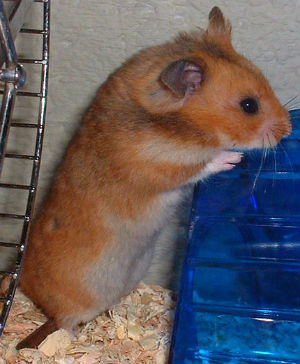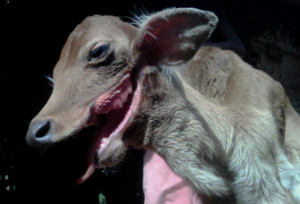Hamster Hybrids
Subfamily Cricetinae
EUGENE M. MCCARTHY, PHD GENETICS, ΦΒΚ

|
Hamster hybrids are covered on this page. According to many internet sources, there have been only two types of hamster hybrids reported, but there are actually quite a few different crosses of this type known (see below).
Cricetus cricetus [Black-bellied Hamster] + Mesocricetus auratus [Golden Hamster] Mating occurred in captivity, but no hybrids were produced. Petzsch 1953, 1956.
Graomys centralis [Central Leaf-eared Mouse] × Graomys griseoflavus (♀) [Gray Leaf-eared Mouse] CHR. LFH. CON: Argentina, in the adjacent to the border between La Rioja and Córdoba. Hybrids of both sexes have been reported. The male hybrids exhibit disrupted spermatogenesis. The IUCN treats centralis as a species, which is treated as subspecies of griseoflavus by Wilson and Reeder (1993). Intenet Citations: GRAOM.
Graomys griseoflavus [Gray Leaf-eared Mouse] See: Graomys centralis.
Mesocricetus auratus [Golden Hamster] See also: Cricetus cricetus. × Arvicola terrestris (♂) [European Water Vole] Mating was observed in captivity, but no hybrids were reported. Arvicola terrestris is usually assigned to the subfamily Arvicolinae (voles, lemmings, and muskrats) of family Muridae. Petzsch 1953, 1956. × Mesocricetus brandti [Brandt’s Hamster] Mating has been observed in captivity, but no hybrids were reported. Todd et al. 1972 × Mesocricetus newtoni (↔) [Romanian Hamster] CHR. DRS. HPF(♀♀). Regarding F₁ hybrids from M. auratus mothers, Todd et al. (p. 76) state that “ovaries have been observed that appear completely normal and support apparently mature follicles.” Growth rate of F₁ hybrids is heterotic. The sternal stripe is dark as in M. newtoni, but narrower. Raicu and Bratosin (p. 133) say that “although mating is easily and repeatedly realized, fecundation takes place rarely, and only after several months of cohabitation.” Parents had 6-10 pups per litter, while hybrids had 2-4. Fur is similar to that of M. auratus, but less reddish. In temperament the hybrids resemble M. auratus (they lack the liveliness and nervousness of M. newtoni). Raicu et al. 1970; Raicu and Bratosin 1968†; Raicu et al. 1969, 1970; Todd et al. 1972. × Peromyscus maniculatus [North American Deer Mouse] Insemination of a P. maniculatus female with M. auratus sperm produced two instances of first cleavage. Maddock and Dawson (1974, pp. 630-631) say that in one of these cases “a regular two-cell stage was observed, and each blastomere indicated regular organization of a mitotic apparatus for the second division.” In another mouse, probable sperm penetration of an ovum was seen.
Mesocricetus brandti [Brandt’s Hamster] See also: Mesocricetus auratus. × Mesocricetus newtoni (♂) [Romanian Hamster] CHR. LFH. The ranges of these hamsters are apparently separated by the Bosphorus. Hybrids of both sexes have been reported. Raicu et al. 1972.
Mesocricetus newtoni [Romanian Hamster] See: Mesocricetus auratus; M. brandti.
Nectomys rattus [Amazonian Mouse | Small-footed Bristly Mouse] × Nectomys squamipes [South American Water Rat] CHR. LFH. A lengthy parapatric contact zone exists in eastern Brazil. Bonvicino et al. 1996.
Nectomys squamipes [South American Water Rat] See: Nectomys rattus.
Phodopus campbelli [Campbell’s Hamster] × Phodopus sungorus [Dzhungarian Hamster | Russian Dwarf Hamster] CHR. CON: southwestern Asia (eastern Kirghiz Steppe?). HPF(♀♀). In hybrids, synapsis of sex chromosomes and autosomes is disturbed during meiosis. Terminal and interstitial asynapsis, and interlocking of autosomes are also common, as is dissociation of the sex chromosomes. Ishishita et al. 2015; Ross 1998; Safronova and Vasil’eva 1996; Safronova et al. 1992, 1993; 1999; Sokolov and Vasil’eva 1994. Internet Citations: PETW.
Phodopus sungorus [Dzhungarian Hamster | Russian Dwarf Hamster] See: Phodopus campbelli.
By the same author: Handbook of Avian Hybrids of the World, Oxford University Press (2006).
 A dog-cow hybrid?
A dog-cow hybrid?